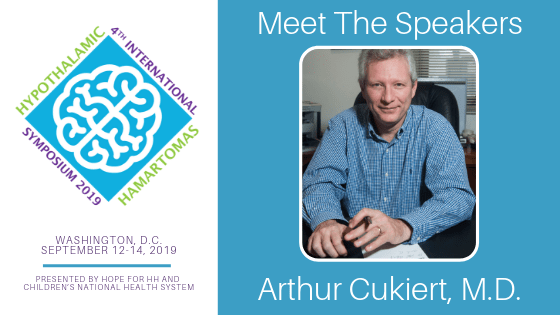
Hope for HH is co-sponsoring the 4th International Symposium on Hypothalamic Hamartomas – a professional symposium for HH investigators, clinicians and researchers – in Washington DC Sept. 12-14. The Symposium aims to identify gaps in understanding and opportunities for future HH research studies and collaborations to improve diagnosis, treatment and care of both the seizures as well as the other endocrinological and neuropsychological symptoms.
In this blog series, we will introduce you to several internationally recognized clinicians and researchers who are thought leaders both inside and outside of HH and who will serve as facilitators, presenters and discussants at the Symposium. Highlights of the Symposium will also be available to the HH patient and professional community following the meeting.
Meet Dr. Arthur Cukiert
Please meet Dr. Arthur Cukiert an internationally recognized neurosurgeon who is presently the Director of the Sao Paulo Epilepsy Clinic and Head of Epilepsy Surgery Program in Sao Paulo Brazil. Dr. Cukiert will be facilitating a discussion on HH Surgery as top neurosurgeons evaluate which procedures not only lead to a cessation or reduction in seizures but also have the least complications and the best outcomes related to cognition, behavior and other comorbidities.
What is your specialty training and background?
Arthur Cukiert was born in Santo Andre, Brazil in July 23rd, 1963. He graduated at Sao Paulo University in 1986 and finished his neurosurgical training at the Hospital das Clinicas of Sao Paulo University in 1991. He spent a year at the Montreal Neurologic Institute as a Clinical & Research Fellow. Back in Brazil, he worked at Sao Paulo Hospital das Clinicas, developed the Hospital Brigadeiro neurosurgical service and was a medical assistant at the ABC Faculty of Medicine in Sao Paulo. He received a PhD degree in Neurophysiology in 1996 from the Biological Sciences Institute of the Sao Paulo University. He is part of the ILAE Pediatric Surgery Task Force and had organized several Epilepsy Surgery Techniques Meetings over the years. He was President of the Brazilian Functional Neurosurgery Society and of the Brazilian Congress of Update in Neurosurgery. He presented more than 400 lectures worldwide, attended to 350 meetings, presented 800 abstracts and published 150 peer reviewed papers and 8 books. His activities center on the surgical treatment of refractory epilepsy and pituitary tumors.
How did you become interested in HH research and care? What are your contributions to the HH field of research and care?
Although rare, HH might prove to be a catastrophic disease. As a specialized tertiary center treating refractory epileptic patients, we often evaluate kids with HH. Our goal is to provide to best multi-professional care to those families. From a scientific perspective, understanding how the epileptic and behavioral syndromes present in HH originate might help to further understand brain function and epileptogenesis.
The Symposium is important because
A huge number of meetings are now available world-widely. On the other hand, specialized small meetings are much more useful to further develop a think-tank on anything.
Outside of work passions
My wife, Cristine, and I love to travel and explore different places and cultures.
Call to Action
Like to share your feedback about the Symposium, speaker or topic, please send your comments to info@hopeforhh.org.
Would you like to support the Symposium and research with a donation to Hope for HH? Click here to Donate.





